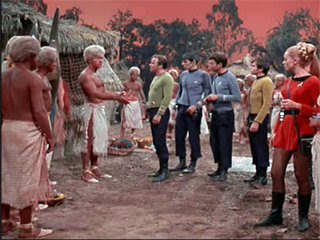
Posted on 05/04/2012 7:46:30 AM PDT by Theoria
In the Solomon Islands, about 10 percent of the dark-skinned indigenous people have strikingly blond hair. Some islanders theorize that the coloring could be a result of excess sun exposure, or a diet rich in fish. Another explanation is that the blondness was inherited from distant ancestors — European traders and explorers who came to the islands.
But that’s not the case, researchers now report. The gene variant responsible for blond hair in the islanders is distinctly different from the gene that causes blond hair in Europeans.
“For me it breaks down any kind of simple notions you might have about race,” said Carlos Bustamante, a geneticist at Stanford University. “Humans are beautifully diverse, and this is just the tip of the iceberg.”
Dr. Bustamante and his colleagues published their findings in the current issue of the journal Science.
The researcher analyzed saliva samples from more than 1,000 islanders, looking closely at a subset of the samples — from 43 blond and 42 dark-haired islanders.
They were soon able to identify the single gene responsible for the variance in hair color. Called TYRP1, the gene is known to influence pigmentation in humans.
The researchers also found that the variant of TYRP1 that causes blond hair in Solomon Islanders is entirely absent in the genomes of Europeans.
“Here you go into an unstudied population with a small sample size and you can really find some cool things,” Dr. Bustamante said. “So what about other places, like what about light pigmentation in parts of Africa? How do we not know the genetic basis of skin and hair pigmentations across the globe?”
(Excerpt) Read more at nytimes.com ...

Just interesting, ping.
HUMMM let’s see could they have got it from one of THESE guys:
http://en.wikipedia.org/wiki/Sons_of_Noah
!!!???

Yep, the exact same thing came to mind for me, too.
Probably from some Marines leaving their mark just passing through
Guadalcanal, New Georgia Island and Bougainville
“The researchers also found that the variant of TYRP1 that causes blond hair in Solomon Islanders is entirely absent in the genomes of Europeans.”
***European traders and explorers who came to the islands. ***
About 45 years ago I read a book on THE LOST FLEET OF ALEXANDER. The author claimed that the fleet did not return west from India upon Alexander’s death, but sailed EAST, into the Pacific and later landed in South America.
Post Du Jour! LMAO!
I still think Humanity has not evolved in 5 thousand years. The evolution will washed away once and for all, with God’s DNA touch.
|
|
|
| GGG managers are SunkenCiv, StayAt HomeMother & Ernest_at_the_Beach | |

|
|
Thanks Theoria. |
|
|
|
|
"The gene variant responsible for blond hair in the islanders is distinctly different from the gene that causes blond hair in Europeans."
Such genealogies were popular in the late medieval period among the merchant class and minor nobles, with something of a Victorian era revival of the practice, it lent a little grandeur to those striving for such. Think Millicent Bucket, lol.
The one I saw did follow the legendary path to the letter, but included an individual belonging to a no doubt mythical people of Ireland, the Tuatha Dé Danann, so it's apocryphal.
The legendary and the genetic don’t necessarily disagree. Tubal, son of Japheth, and descendants were noted for their skill with metal. The dominant haplotype of Ireland, Wales, scottish highlanders, etc. traces through Bronze Age areas noted for metallurgy.

History has long maintained that the Anglo-Saxon overtaking of the Iron Age Celts was the origin of the British people. Celtic Britain reconstructs the peopling of Britain — through a study of genetics, climatology, archaeology, language, culture, and history — and overturns that myth and others. The Anglo-Saxons, who supposedly conquered the Celts, contributed only five to ten percent of the British gene pool. The “Atlantic Celts,” long believed to have migrated to Britain from Central Europe around 300 BC during the Iron Age, can be linked genetically to the people of Basque country. And linguistic evidence suggests that, besides Celtic languages, a Germanic-type language similar to Norse was also spoken in Britain long before the arrival of the Anglo-Saxons.
In this groundbreaking study, Stephen Oppenheimer explaines the surprising roots of the present-day cultural identities of the English, Irish, Scottish, and Welsh.
Ya’ think! :>)
Awesome collection of quotes on your home page.... Good reads !
Stay Safe !
Disclaimer: Opinions posted on Free Republic are those of the individual posters and do not necessarily represent the opinion of Free Republic or its management. All materials posted herein are protected by copyright law and the exemption for fair use of copyrighted works.